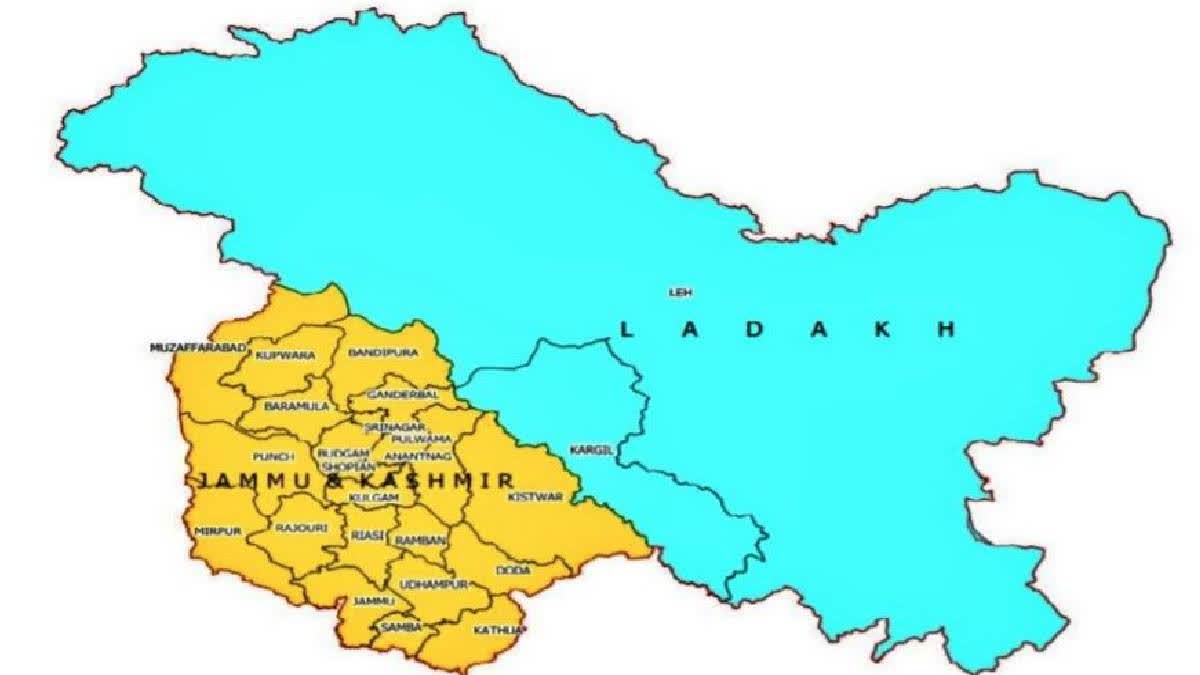Srinagar (Jammu and Kashmir): The aftermath of the "controversial" abrogation of Article 370 in August 2019 has been characterised by a series of policy decisions aimed at reshaping Jammu and Kashmir's socio-political landscape. While these decisions were envisaged to usher in development, inclusivity, and integration, they have also triggered a cascade of reactions, yielding a complex fallout that warrants scrutiny. Here is a timeline of some of the top policy decisions taken by the government since August 5, 2019.
2019:
August 5: The Indian government revokes Article 370, effectively nullifying the special status of Jammu and Kashmir. The region is reorganized into two separate Union Territories – Jammu & Kashmir, and Ladakh.
2020:
January 22: The Jammu and Kashmir Reorganization (Adaptation of Central Laws) Order, 2020 is issued. This adaptation paves the way for several central laws to be extended to Jammu and Kashmir, ensuring greater uniformity with the rest of India.
April 1: The government inserted a clause for domicile category under which a person has to stay in the Union Territory for a period of 15 years. Children of all-India services personnel who have served there for 10 years also come under the category.
2021:
February 6: The Jammu and Kashmir Reorganization (Adaptation of State Laws) Order, 2021 is promulgated. This order adapts various state laws to align them with the constitutional changes post-abrogation of Article 370.
April 3: The Jammu and Kashmir Industrial Land Allotment Policy, 2021 is introduced. The policy aims to attract investment by making land available for industrial purposes.
August 5: On the second anniversary of Article 370 abrogation, the Jammu and Kashmir Lieutenant Governor Manoj Sinha announces Jammu & Kashmir Film Policy 2021. The policy is aimed to transform Jammu Kashmir into the most preferred destination for the Entertainment Industry, reviving J&K’s halcyon days of being a cinematographer's delight and bringing back the Golden Era of film shooting in J&K.
2022:
February 11: The Jammu and Kashmir Panchayati Raj (Amendment) Act, 2022 is enacted, granting more powers to Panchayats in a bid to enhance local governance.
April 14: The government introduces the Jammu and Kashmir Skill Development Mission, focusing on imparting vocational skills and enhancing employability.
August 5: On the third anniversary of Article 370 abrogation, the government announces a comprehensive plan to revitalize the region's economy, focusing on sectors like tourism, agriculture, and infrastructure.
2023:
January 15: The Jammu and Kashmir Development Finance Corporation is established to facilitate funding for developmental projects and initiatives.
February 21: The Jammu and Kashmir government announces that Property tax will be imposed in Jammu and Kashmir from April 1, 2023. The tax was announced under Section 71A of the Jammu and Kashmir Municipal Act, 2000, read with Sub-Section 1 of Section 65 and Sub-Section 1 of Section 73. The Act requires all residents living in municipal areas to pay a property tax on their residential and non-residential properties.
June 18: The Jammu and Kashmir Public Services Guarantee Act is amended to ensure time-bound delivery of public services, enhancing administrative efficiency and transparency.
July 12: The Jammu and Kashmir Land Revenue (Amendment) Act, 2023 is introduced, bringing about reforms in the land revenue administration to streamline processes and ensure clarity in land transactions.
The fallout of these decisions encapsulates a spectrum of emotions and perspectives. Proponents highlight a renewed focus on development, governance reforms, and empowerment of local bodies. They argue that these initiatives have the potential to uplift the region and bridge historical gaps. Conversely, critics voice apprehensions about erosion of cultural uniqueness, demographic shifts, and environmental trade-offs. The adaptation of laws and policies that aim at integration, has ignited concerns about dilution of the region's distinct identity.


